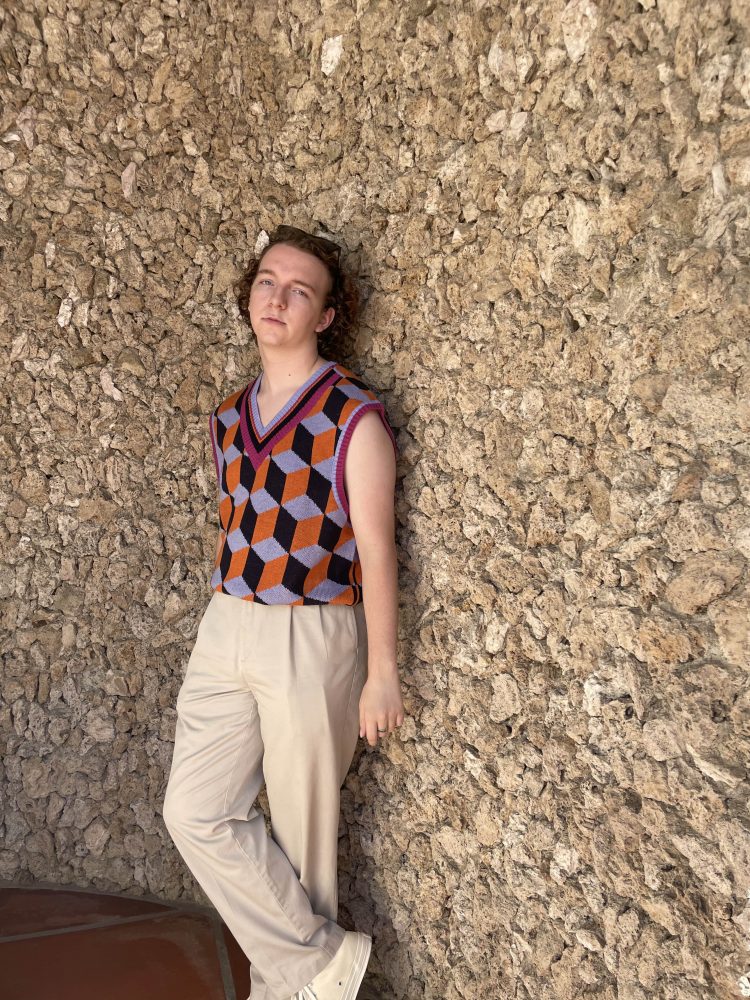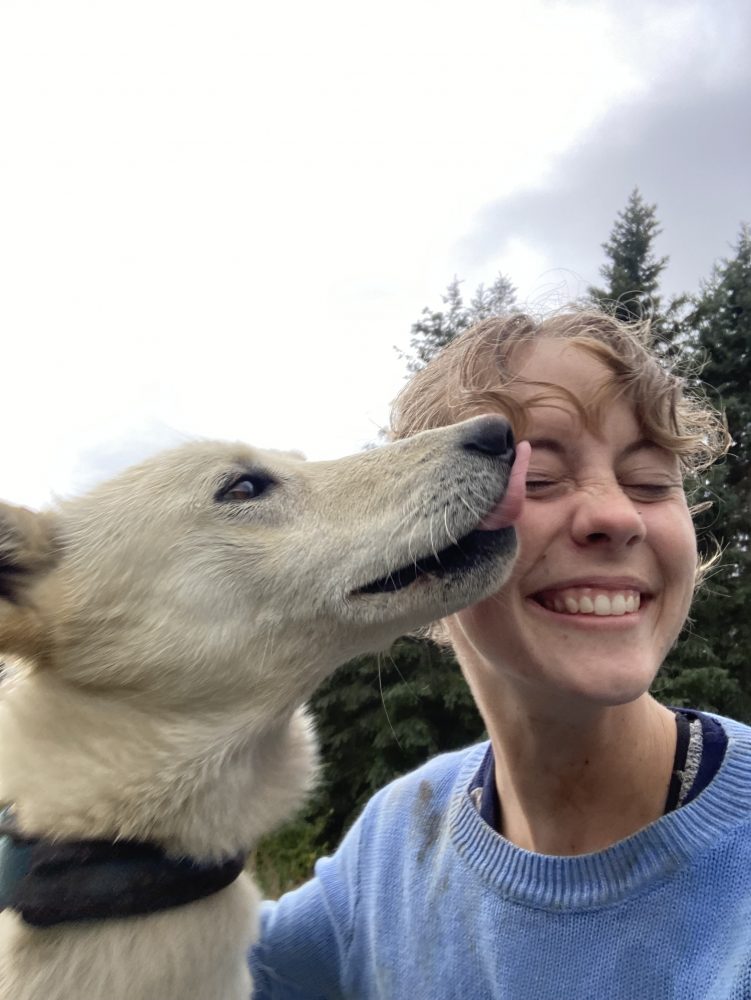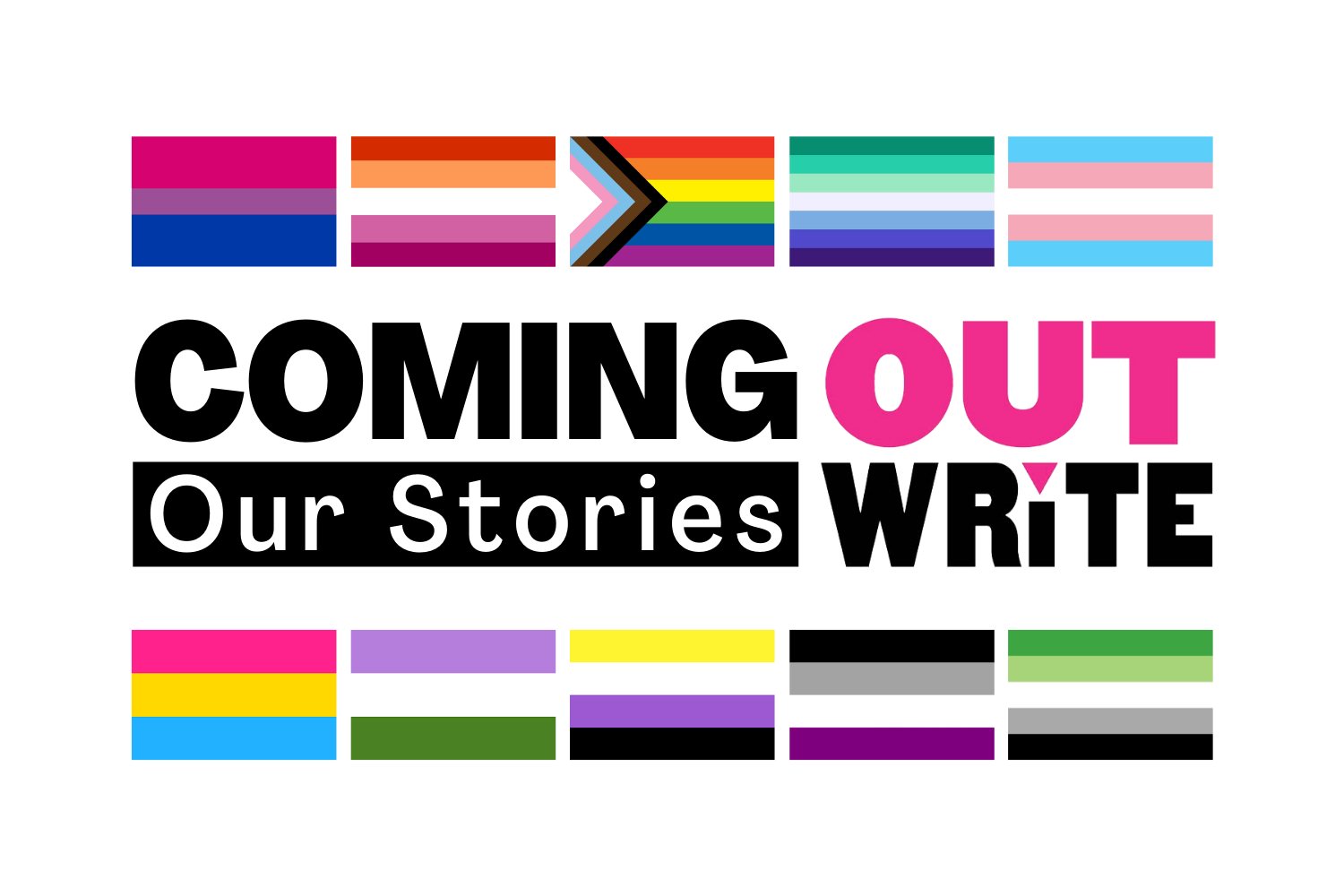Graphic by Christopher Ikonomou (Xe/He)
Members of the queer community are expected to “come out” because our society views being cisgender and heterosexual as the default. However, everyone’s identity is their own. We should be able to come out on our own terms, if we do at all, and remember that our safety matters above all else. Let us hope for a future where all queer people can exist freely without pressure to reveal our personal lives in order to gain respect.
The LGBTQIA+ community is not a monolith, and each queer person has a unique and complex relationship to coming out. In honor of National Coming Out Day 2021, members of OutWrite have shared their experiences with and thoughts about coming out, giving some perspective from our own little corner of the queer community. This article compiles their stories, originally posted on our Instagram page.
Jaden King (he/they), Editor-in-Chief
Label(s): gay, nonbinary, queer

“I’ve had many coming out stories: one to the general public, several to my family members, and constantly experiencing one under the pressure of societal norms.
Initially, it started out with a nice post on my Snapchat and Instagram stories claiming that I was bisexual when I was 16, under the pretense that I’d be at least “somewhat straight.” And, in fact, I had been in relationships with women up until that point. However, I slowly began to shed that identity as I became more comfortable and in-tune with my general sexual and romantic attractions towards men.
I came out to my family, often times only when they directly asked me, and everyone immediately in my circle as bisexual but, in that personal journey, found more comfort in identifying as gay. I never directly came out again as gay but simply switched the terminology I used to define my identity.
In fact, I take some anger with the concept of “coming out.” Coming out is not a one-and-done kind of thing. Coming out is a continual process that never stops because we operate within a cisheteronormative society that others and marginalizes queerness. Coming out is not something that we as queer people owe anybody.
The only “coming out” that really matters is coming to terms with your identity and always working on being willing to grow from and with that identity.
So, in a sense, this post is counterproductive to my feelings towards coming out. However, I find comfort in identifying myself as a gay, queer, non-binary person, but I’m not saying this because I owe it to anybody. I’m saying this because I know visibility is important to other queer people who feel alone. I’m saying this because I’m proud of who I am. I’m saying this because I recognize where I am in my personal journey, and I am looking forward to growing from and with my identity as a gay, queer, non-binary individual.”
Zoë Collins (she/her), Photography and Co-Graphics Head, Environmental Science & Marine Biology Major
Label(s): lesbian

“At OutWrite, we’ve talked a lot about how coming out is something of an antiquated practice because it tends to promote the idea that queer communities are some sort of “other” and that we must come out to gain recognition. These concerns are valid and important, but, for me, coming out is a much more sensitive topic.
I was outed to my mom in high school, and she slid a note under my door one night telling me that she knew what I was and that god could fix me. It was hard to read, and I never really felt comfortable at home after that. It was really painful to be put in that position, but also, it was very freeing.
For the first time, I could hold my girlfriend’s hand in public, and I didn’t have to constantly have cover stories when I spent time with queer friends. It was freeing in a way, but I was still in an environment that was very homophobic and unwelcoming, and I had to work every day to save all I had to get out. Now, I’m living in a household with only queer people and I get to write and take photos for organizations like OutWrite. So if you’re like me and days like National Coming Out Day are a little bit harder, you’re not alone. It’ll get better, I promise.”
Member of OutWrite (she/they)
Label(s): nonbinary, lesbian
“I was outed to my family. Since some time around middle school, I had been building up this moment in my head, planning it out, imagining the scenarios and consequences, all the while being completely terrified of the whole ordeal, until junior year of high school. I had written a piece for a class that got lots of attention, a whole award and everything, and it was posted online. I told my parents I wasn’t comfortable with them reading it, but once it went up online, that was out the window. My father read it and shared it with the whole family, and he told me he did this very casually over a phone call while I was with a friend.
I felt like my entire world had shifted, like something had broken. And I got the iconic line, “It’s not like we couldn’t tell already.” I wanted to scream, I actually did, and was so furiously upset I didn’t talk to my father for a cool week. You have this idea, this ideal in your head, and you spend so long, literally years, building up the courage to step into your own identity, and it just gets ripped from you. It was one of the worst feelings.
There are so many opinions on coming out, on whether it degrades us as people or is contributing to the system of our oppression, but I feel like the reality is our expression of ourselves can lead to drastic changes within relationships, even end them completely, and it’s natural to fear change, especially within one’s family. It’s natural for us to be hesitant to do something that we know will alter the way people think of us, so I think coming out is important, not for the sake of other people, but for us to have as moments to prove to others and ourselves that we’re strong enough to face that change.
Now, I’m in the same position again where I’ve began to comfortably live my life as non-binary and go by a new name but am unwilling to deal with the transphobia I know will come from my family if I tell them. It’s agonizing, honestly. I do hate the sense of responsibility it shoves onto me and the way it makes me feel like who I am is something that is inherently hidden, but sometimes, that’s just our reality. When our other option is creating an unsafe environment for ourselves, it really is a matter of picking a lesser of two evils.”
Copy Editor at OutWrite, Sociology Major
Label(s): pansexual
“I leaned in and out of the closet multiple times growing up. When I was 12 and at a sleepover one night, one of my friends came out as pansexual to all of us. I didn’t know what the phrase meant, but the more research I did into it, the more I grew attached to the concept. Thinking of myself as pan, it felt like someone had called me by the right name for the first time.
I came out as pansexual at 13 to a few people but was told it was likely just a phase, so I immediately hid back in and ignored what I already knew until I was 16, and I fell for a girl. At that point, I came out again because I wanted to be with her, and while no one was outwardly mean or unsupportive, I’ve dealt with erasure of my sexuality and passive aggressive treatment for years.
I have been met with skepticism and the mentality of “well, it’s fine as long as you end up with a nice boy” for as long as I’ve been out, but I’ve also received so much love and acceptance from so many incredible people in my life that drowns out the negativity.
My one regret in the journey of my coming out would be that I hid myself away for years because I let people tell me that this essential aspect of my being was fake and that I didn’t know well enough to decide who I was for myself.
You know who you are better than anyone ever will; don’t let people try to persuade you otherwise and mold you into who they think you should be.”

